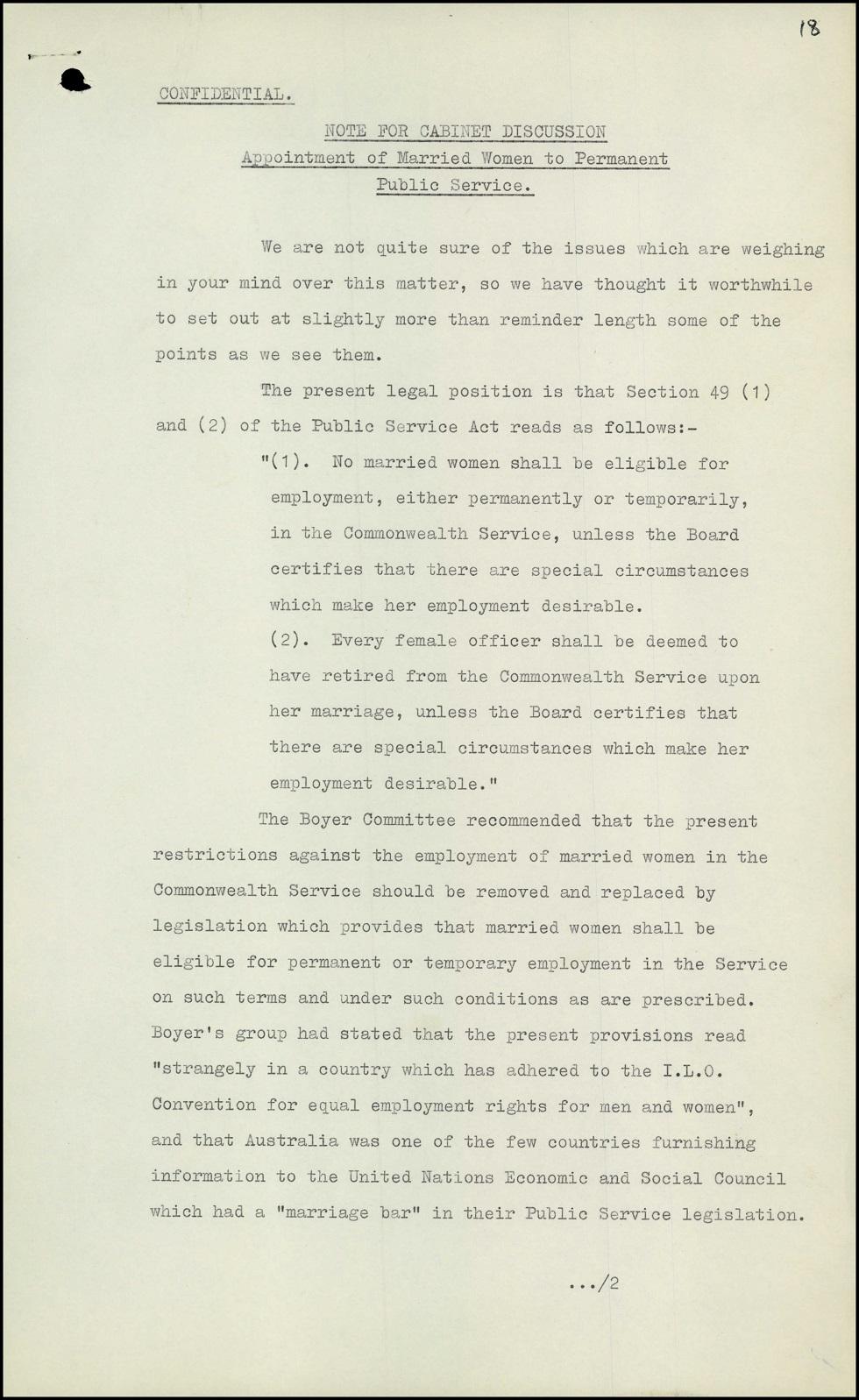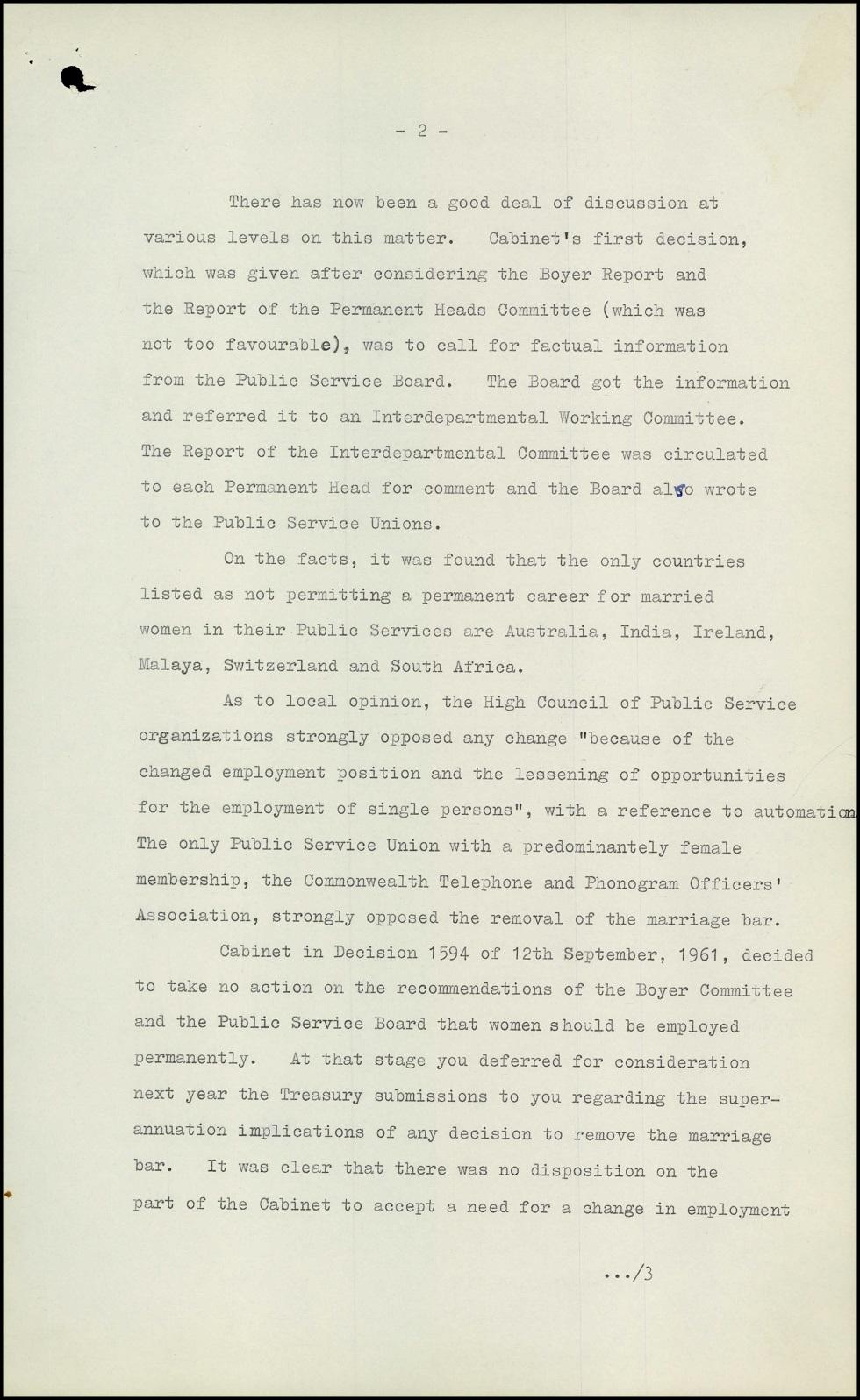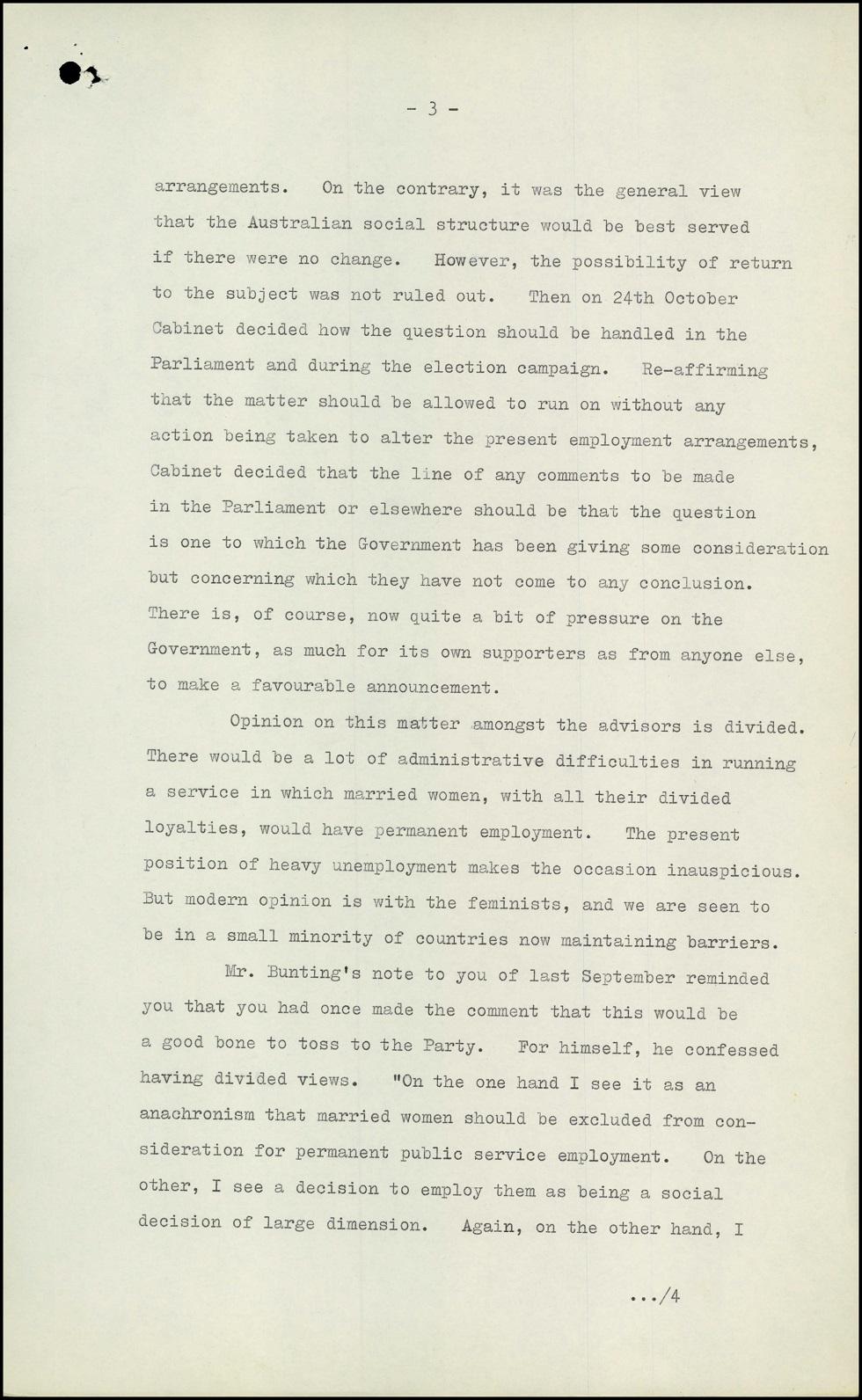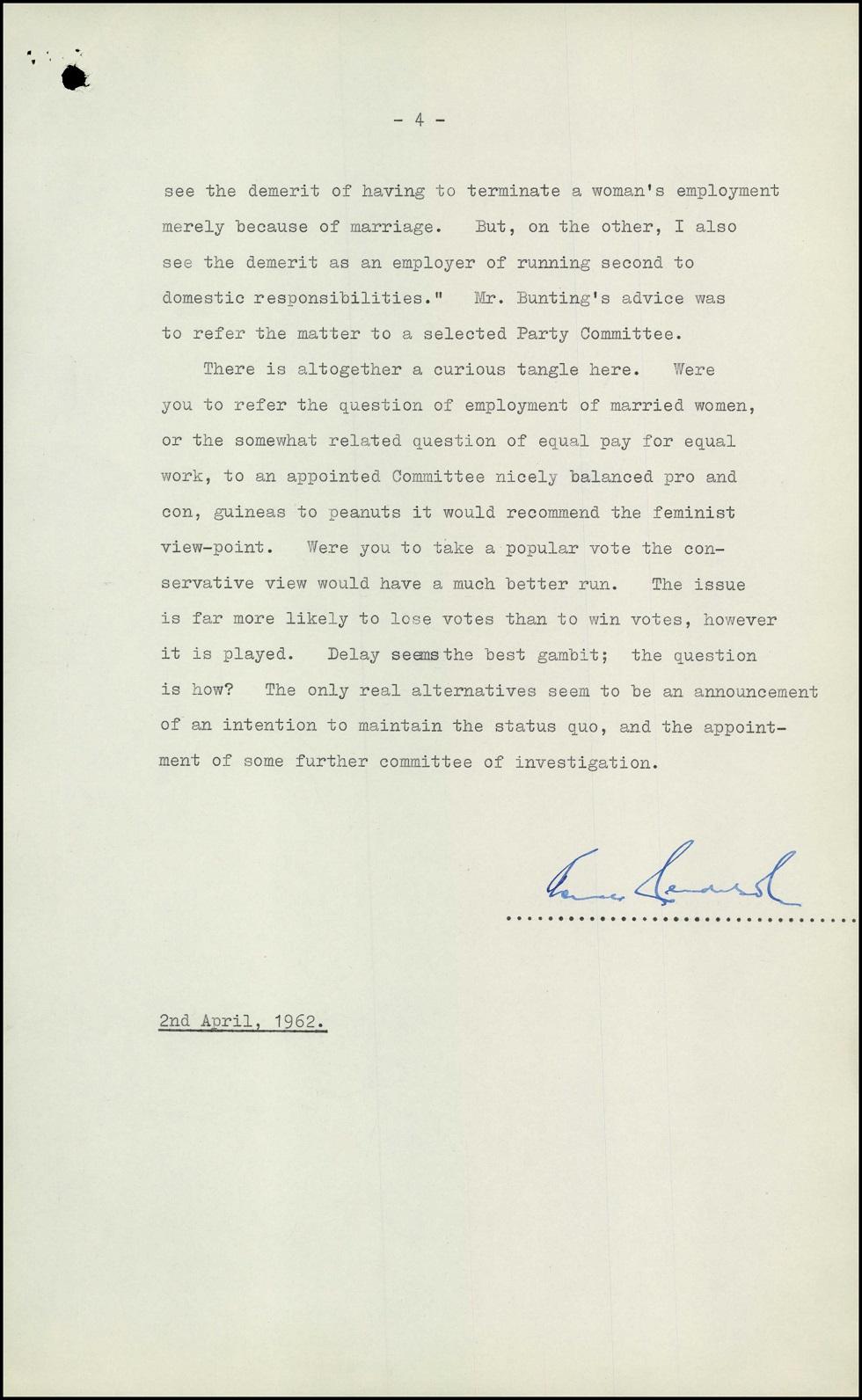



Aboriginal and Torres Strait Islander people should be aware that the National Archives' website and collection contain the names, images and voices of people who have died.
Some records include terms and views that are not appropriate today. They reflect the period in which they were created and are not the views of the National Archives.





[Page 1.]
[handwritten, black ink:] 18
[underlined] CONFIDENTIAL.
NOTE FOR CABINET DISCUSSION
Appointment of Married Women to Permanent Public Service.
[end underlined text.]
We are not quite sure of the issues which are weighing in your mind over this matter, so we have thought it worthwhile to set out at slightly more than reminder length some of the points as we see them.
The present legal position is that Section 49 (1) and (2) of the Public Service Act reads as follows: -
"(1). No married women shall be eligible for employment, either permanently or temporarily, in the Commonwealth Service, unless the Board certifies that there are special circumstances which make her employment desirable.
(2). Every female officer shall be deemed to have retired from the Commonwealth Service upon her marriage, unless the Board certifies that there are special circumstances which make her employment desirable."
The Boyer Committee recommend that the present restrictions against the employment of married women in the Commonwealth Service should be removed and replaced by legislation which provides that married women shall be eligible for permanent or temporary employment in the Service on such terms and under such conditions as are prescribed. Boyer’s group had stated that the present provisions read "strangely in a country which has adhered to the I.L.O. Convention for equal employment rights for men and women", and that Australia was one of the few countries furnishing information to the United Nations Economic and Social Council which had a "marriage bar" in their Public Service legislation.
…/2
[Page 2.]
- 2 -
There has now been a good deal of discussion at various levels on this matter. Cabinet’s first decision, which was given after considering the Boyer Report and the Report of the Permanent Heads Committee (which was not too favourable), was to call for factual information from the Public Service Board. The Board got the information and referred it to an Interdepartmental Working Committee. The Report of the Interdepartmental Committee was circulated to each Permanent Head for comment and the Board also [‘s’ handwritten in to replace another illegible letter] wrote to the Public Service Unions.
On the facts, it was found that the only countries listed as not permitting a permanent career for married women in their Public Services are Australia, India, Ireland, Malaya, Switzerland and South Africa.
As to local opinion, the High Council of Public Service organisations strongly opposed any change "because of the change employment position and the lessening of opportunities for the employment position and the lessening of opportunities for the employment of single persons", with a reference to automation. The only Public Service Union with a predominantly female membership, the Commonwealth Telephone and Phonogram Officers’ Association, strongly opposed the removal of the marriage bar.
Cabinet in Decision 1594 of 12th September, 1961, decided to take no action on the recommendations of the Boyer committee and the Public Service Board that women should be employed permanently. At that stage you deferred for consideration next year the Treasury submissions to you regarding the superannuation implications of any decision to remove the marriage bar. It was clear that there was no disposition on the part of the Cabinet to accept a need for a change in employment [continued on next page…]
…/3
[Page 3.]
- 3 -
arrangements. On the contrary, it was the general view that the Australian social structure would be best served if there were no change. However, the possibility of return to the subject was not ruled out. Then on 24th October Cabinet decided how the question should be handled in the Parliament and during the election campaign. Re-affirming that the matter should be allowed to run on without any action being taken to alter the present employment arrangements, Cabinet decided that the line of any comments to be made in the Parliament or elsewhere should be that the question is one to which the Government has been giving some consideration but concerning which they have not come to any conclusion. There is, of course, now quite a bit of pressure on the Government, as much for its own supporters as from anyone else, to make a favourable announcement.
Opinion on this matter amongst the advisors is divided. There would be a lot of administrative difficulties in running a service in which married women, with all their divided loyalties, would have permanent employment. The present position of heavy unemployment makes the occasion inauspicious. But modern opinion is with the feminists, and we are seen to be in a small minority of countries now maintaining barriers.
Mr. Bunting's note to you of last September reminded you that you had once made the comment that this would be a good bone to toss to the Party. For himself, he confessed having divided views. "On the one hand I see it as an anachronism that married women should be excluded from consideration for permanent public service employment. On the other, I see a decision to employ them as being a social decision of large dimension. Again, on the other hand, I
…/4
[Page 4.]
- 4 -
see the demerit of having to terminate a woman's employment merely because of marriage. But, on the other, I also see the demerit as an employer of running second to domestic responsibilities." Mr. Bunting's advice was to refer the matter to a selected Party Committee. There is altogether a curious tangle here. Were you to refer the question of employment of married women, or the somewhat related question of equal pay for equal work, to an appointed Committee nicely balanced pro and con, guineas to peanuts it would recommend the feminist view-point. Were you to take a popular vote the conservative view would have a much better run. The issue is far more likely to lose votes than to win votes, however it is played. Delay seems the best gambit; the question is how? The only real alternatives seem to be an announcement of an intention to maintain the status quo, and the appointment of some further committee of investigation.
[handwritten signature, blue ink.]
[underlined] 2nd April, 1962.
In this note Ronald Mendelsohn, an adviser to Prime Minister Menzies, writes to Cabinet to provide background information on the employment of married women in the Commonwealth Public Service. Mendelsohn describes the advantages and disadvantages of allowing women to continue in the public service after marriage, including political implications.
In 1962 the Commonwealth Public Service Act 1922 was still in force and female Commonwealth Public Service employees were required to resign when they married. Although this Act applied only to women in the Commonwealth Public Service, the marriage bar—the ban on married women working— was commonplace, as other government and non-government employers often followed the example set by the Commonwealth.
In 1958, Prime Minister Robert Menzies commissioned a committee, chaired by Sir Richard Boyer, to review the marriage bar. The Boyer Report recommended removal of the marriage bar on the grounds that it wasted female talent in the community; that women—rather than the state—were best-placed to manage the demands of work and home; and that comparable countries had already removed the bar. Despite this advice, the Menzies Cabinet did not support change.
The Menzies Cabinet considered that a woman’s primary role was to care for her family and that a man’s role was to be the breadwinner (that is, the provider). They thought that married women would not be able to manage the competing demands of domestic work and the paid workforce. They were also concerned that male unemployment rates—already high—would rise further if married women could enter the workforce, and that this would be unpopular with voters.
Despite these attitudes within Cabinet, there was public support for the removal of the marriage bar. The advice provided to Menzies was that he would lose votes on the issue regardless of his position and it was better to remain quiet. For the next seven years, when questioned, Menzies would respond that the matter was still under consideration.
At the beginning of 1966 Menzies retired as Prime Minister. Pressure from the public, the Opposition and members of the Government led to the removal of the marriage bar.
Learn how to interpret primary sources, use our collection and more.
